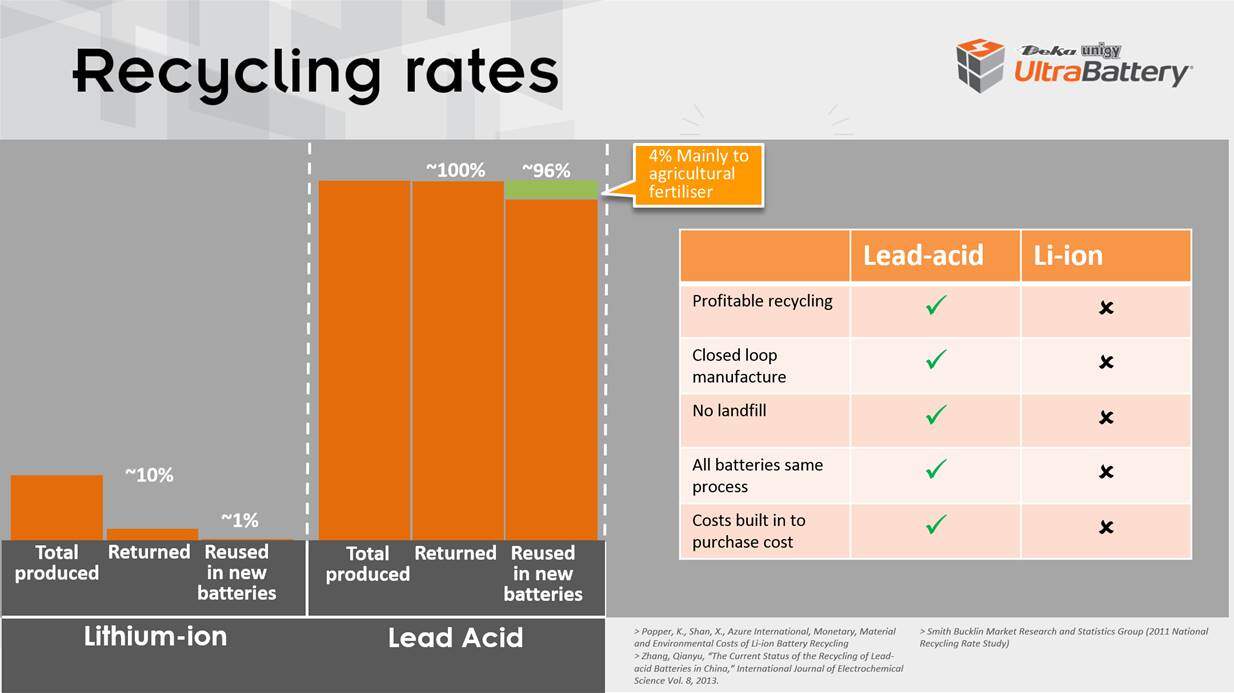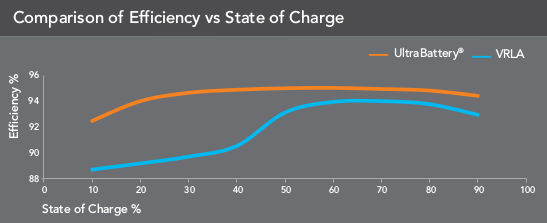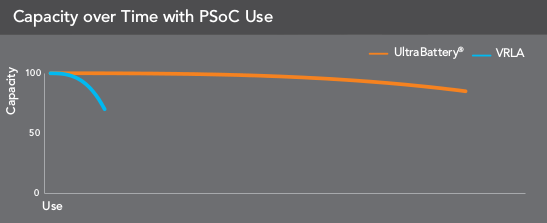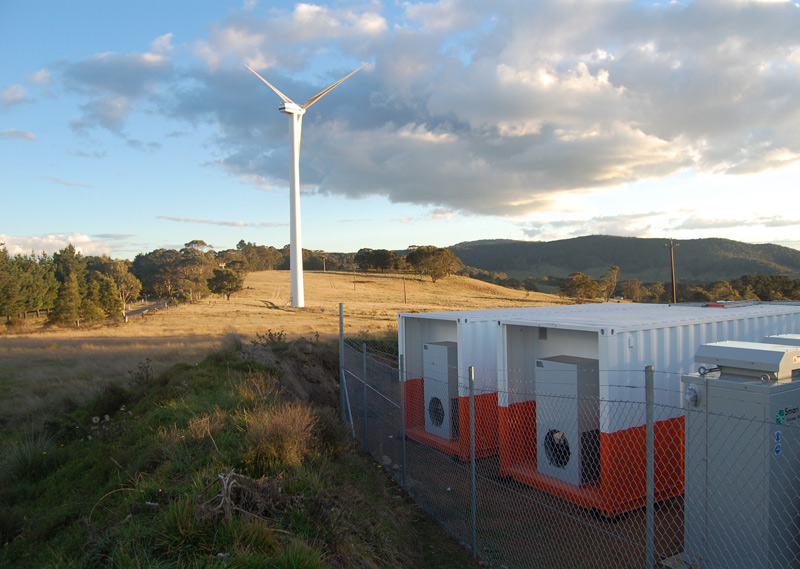Ecoult is the developer of a hybrid battery and carbon-based ultracapacitor called the ‘UltraBattery’ that rivals lithium-ion batteries on performance and beats them on costs. Already deployed in a number of grid-support and industrial applications, the company is also aiming to bring the UltraBattery into homes and small businesses in the near future.
Lithium-ion vs lead acid: An old paradigm being flipped on its head
Lithium-ion batteries are all the rage these days: Their tolerance to deep discharging, long cycle life and ability to ‘ramp up’ to provide large volumes of power quickly have made them the battery of choice for electric vehicles (EVs), with Tesla Motors playing a leading role in improbably making these batteries ‘sexy’. Lithium-iron phosphate (LiFePO4) is the variety of lithium-ion battery with the broadest appeal thanks to its favourable specification profile and relative safety & affordability.
Lead acid batteries, on the other hand, seem to have been dismissed out of hand as a parade of new energy storage products pile into the Australian market. The two most popular types of lead acid batteries – ‘wet cell’ (flooded) and gel & AGM variants of ‘valve-regulated’ lead acid (VLRA) batteries – are commonplace enough to have received virtually no media attention as an option for home energy storage, despite (or perhaps because of) competitive pricing, easy recyclability and being widely deployed & well-understood by the industry.
It’s also worth noting that lead acid batteries do not have the same sort of freight safety restrictions that lithium-ion batteries do, meaning there are fewer hurdles when it comes to importing them to Australia.
 Recycling rates: Lead acid vs lithium-ion. (Image via Ecoult.)
Recycling rates: Lead acid vs lithium-ion. (Image via Ecoult.)
How the UltraBattery offers the best of both worlds
Ecoult’s UltraBattery takes the undeniable benefits of lead acid batteries and fuses them with the features that make LiFePO4 batteries so attractive. What makes it so ‘ultra’?
Firstly – and arguably most importantly – the UltraBattery has a longer operational life even with deeper regular discharging than conventional lead acid batteries (60% usable energy cycling vs 30-50% for most lead acid batteries) – at a competitive price point. This means that more of the energy stored within the battery is actually accessible for regular use – and for a much longer period of time. This means more value for each unit of energy stored.
Secondly, the UltraBattery is capable of impressive feats of instantaneous power output, when required. Contrast this with conventional lead acid batteries, which struggle to satisfy high power demand (e.g. multiple devices operating at once) even if they have enough energy stored within them to meet it. To draw a plumbing analogy, the UltraBattery has a significantly larger ‘spout’ for delivering and receiving energy than do conventional lead acid batteries. Thanks to its hybrid nature, the UltraBattery can also be occasionally discharged 100% in order to support critical events, meaning that on top of performing its normal daily application, supplying even more energy when it is needed most – for example, in the event of a grid blackout.
Thirdly, the UltraBattery happily operates at partial states of charge (PSOC). Flooded lead acid and VRLA batteries function best under a clean charge/discharge regime: Withdraw energy steadily, then charge back up steadily. Partially discharging then recharging traditional lead acid batteries repeatedly on a regular basis has detrimental impacts on their longevity and overall efficiency; this is not an issue with most of their lithium-ion counterparts.
 The UltraBattery is stores and discharges energy significantly more efficiently than a conventional valve-regulated lead acid (VRLA) battery – especially at partial states of charge.
The UltraBattery is stores and discharges energy significantly more efficiently than a conventional valve-regulated lead acid (VRLA) battery – especially at partial states of charge.
Lastly, the UltraBattery is overall significantly more tolerant to general ‘abuse’. All of these facts about the UltraBattery knock back the conventional wisdom that lead acid batteries are fragile and must be treated delicately in order to extend their lifespan. The UltraBattery is clearly much more robust in demanding environments than flooded and VRLA batteries.
 The UltraBattery retains its ability to hold a charge much better than VRLA when operating at partial state of charge over the course of its lifetime.
The UltraBattery retains its ability to hold a charge much better than VRLA when operating at partial state of charge over the course of its lifetime.
Going from large-scale to small-scale: The UltraBattery’s growing range of applications
Ecoult’s hybrid battery and carbon-based ultracapacitor technology was first developed by Australia’s own CSIRO before being put into commercial production by East Penn Manufacturing in the US state of Pennsylvania. The UltraBattery has been widely deployed in medium to large-scale applications around the globe – including wind smoothing, solar smoothing & shifting, diesel microgrid support and ancillary grid services.
 Ecoult’s UltraBattery Storage Systems deployed for smoothing services at NSW’s Hampton Wind Farm.
Ecoult’s UltraBattery Storage Systems deployed for smoothing services at NSW’s Hampton Wind Farm.
On the back of its success in these fields, Ecoult is delving into smaller-scale applications, recently introducing a 29 kilowatt-hour nominal (kWh) battery bank for small-scale commercial applications. Ecoult has also announced that it will be introducing a 5kWh unit around mid 2016.
Interested? Contact Ecoult
Sean Jobe, Business Development Manager
Email: info@ecoult.com
Phone: +61 2 9241 3001
© 2015 Solar Choice Pty Ltd
I have a question about the ecoult battery. What is the energy price per watt for the Ecoult Battery?
Hi Zach,
‘Price per kilowatt-hour’ would probably be the better terminology to use (although battery pros would probably say that ampere-hours is a more appropriate one). ‘Price per watt’ is usually used in reference to solar panel installations prices.
Next-gen battery prices (i.e. not your standard, run-of-the-mill lead acid) tend to be in the range of $1,000-$2,000 per kWh installed. I don’t know exactly where Ecoult sits on this scale, but they would argue that the thing to look at would be the long-term value of the energy instead.
I’d recommend getting in touch with them directly using the contact details in the above article.
Hello, I currently have a stand alone solar system with a wet lead acid battery bank with 33 kilowatt hour storage capacity. It’s 15 years old so will probably need replacing soon and services a system with 16x 64 watt solar panels running on 48 volts.your new 29Kwh battery sounds interesting . Is it available, how much does it cost? I live in south eastern Australia
Yours Terry
Hi Terry,
I’ve reached out to Ecoult directly with your enquiry and they should be in touch with you with a response soon.
If you’re considering options other than the Ecoult battery, you can request a battery storage quote comparison through our site by filling out the Quote Comparison request form to the right of this page. By doing so you’ll be able to compare a range of storage options (and prices) from installers in your area.